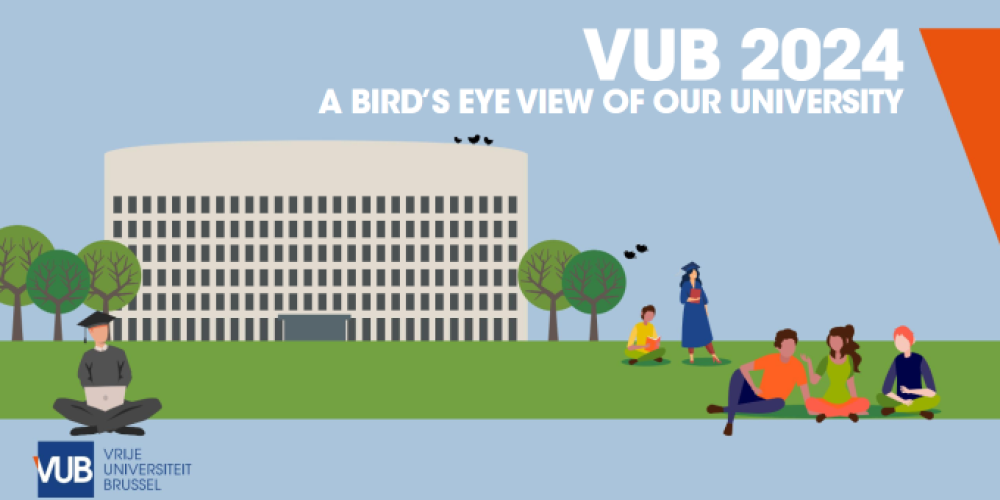
The Free University of Brussels (VUB) has published its annual Facts & Figures 2024. The document provides a clear overview of key developments within the university in education, research, and societal engagement. The data show that the university continues to grow across all domains: student numbers are rising, international appeal is increasing, and research funding has reached a historic high.
VUB rector Jan Danckaert: "We are living in a time of geopolitical instability and societal uncertainty. In this light, these figures are more than mere statistics: they reflect the trust in the role of universities as engines of knowledge, innovation, and progress. The growth of our student population and the international recognition of our research demonstrate that VUB offers a solid academic foundation for those who want to actively contribute to the future of science and society.”
Student population continues to grow
In the academic year 2024-2025, 24,199 students are enrolled at the VUB, an increase of 3.57% compared to the previous year. The largest faculty is Social Sciences & Solvay Business School with 6,543 students, followed by Psychology & Educational Sciences (2,929) and Medicine & Pharmacy (2,367). The Faculty of Sciences & Bioengineering Sciences (2,216) and Engineering Sciences (1,626) also experienced substantial growth. The Faculty of Physical Education & Physiotherapy grew by almost 17%, while the teacher training program (MILO) recorded a notable 16.8% increase.
International students from 151 countries
The internationalisation of the student population continues strongly. In total, VUB now hosts 5,950 international students from 151 countries, accounting for 24.38% of the total student body. The international presence is especially strong in master's and PhD programs: 24.7% of master's students and 54% of doctoral candidates come from abroad. The largest groups of international students come from the Netherlands (608), China (324), Spain (302), Iran (238) and Turkey (202). Of these, 57% are from countries within the European Economic Area (EEA), while 43% come from non-EEA countries.
Vice-Rector Karin Vanderkerken explains this trend: "Our international students are essential in shaping all our students into global citizens. Through networks like EUTOPIA, we reinforce our international reputation as the university of the future."
Record research funding
VUB has also achieved historic results in the field of research. In 2024, a record €156.5 million was invested in research. This makes the university the most successful Brussels institution in attracting European research funding. Under the Horizon Europe program, 158 projects were approved, securing €102.1 million in EU contributions. Additionally, the VUB received five prestegious ERC grants and nine Marie Skłodowska-Curie fellowships. Significant infrastructure investments were also made, including the Brubotics Rehabilitation Research Center, the Brussels Digital Text Lab, and he Visual and Spatial Tissue Analysis platform.
Award-winning researchers
The university’s scientific impact is also reflected in the recognition received by individual researchers. Mathematician Sam Mattheus solved an 85-year-old problem and won both the EOS Pipette Award and the international Frontiers of Science Award. Ann Van Griensven was appointed to an AXA Research Chair for her work on water quality and climate adaptation. The Brubotics team was honored by the Royal Flemish Academy of Sciences for its science communication effort, and Climate scientist Wim Thiery received the Laureate of the Academy prize for his research on climate extremes.
Medical firsts at UZ Brussel
The UZ Brussel, the university hospital of the VUB, reaffirmed its pioneering role with several medical firsts. It was the first hospital in the world to perform a dual robot-assisted lymph node transplant. Additionally, the first wireless atrial pacemaker in Belgium was successfully implanted. Other groundbreaking studies show that in-vitro maturation (IVM) is just as effective as IVF for women with PCOS, but with fewer side effects. Thanks to a new imaging technique, doctors can immediately check whether all tumor cells have been removed following breast-conserving surgery.
VUB rector Jan Danckaert looks upon the scientific work at VUB with great satisfaction. “Many of our researchers belong to the international top in fields such as biomedical sciences, artificial intelligence, robotics, photonics, sustainable energy, and e-mobility. They lead international consortia, develop new therapies, drive technological innovation, and publish in the highest echelons of science. This expertise flows directly into the lecture halls of VUB. Our students are taught by researchers who are leaders in their field. This not only makes VUB students academically strong, but also prepares them for roles as scientific, medical, and societal pioneers in the world of tomorrow.”
VUB continues to invest in societal engagement, sustainability, and inclusion. Through outreach initiatives like the Children’s University, sustainable campus development, and a growing offering of micro-credentials and lifelong learning opportunities, the university is building a future-proof learning environment. Its participation in the EUTOPIA network strengthens the European dimension of its education and research.
With Facts & Figures 2024, the VUB presents itself as a university in motion: ambitious, international, and deeply rooted in society. You can view and download the report here.